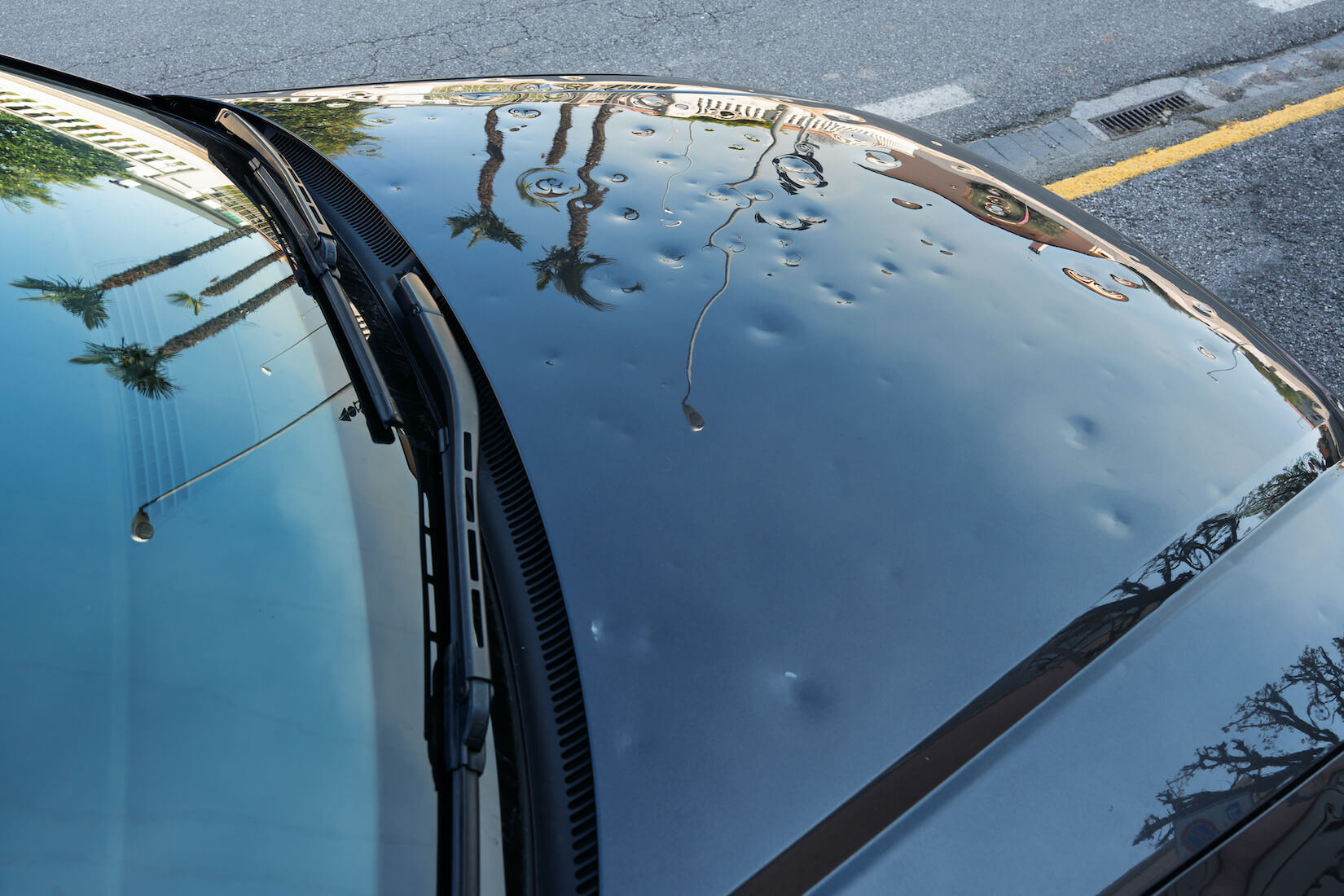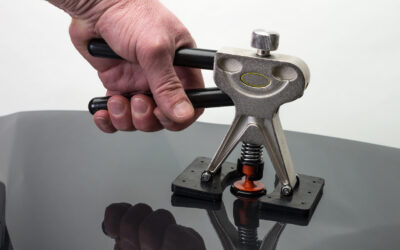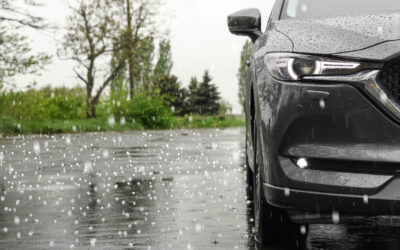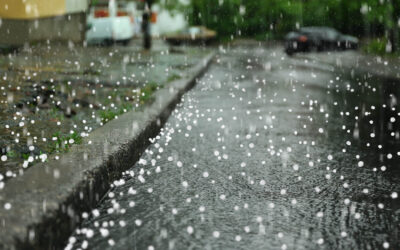An unexpected hailstorm can damage your vehicle so severely that it could be a total loss. From deep divots in panels to cracked paint or hundreds of pockmarks, the fix can outweigh the car’s actual value.
For drivers in hail-prone areas like Denver — smack in the middle of ‘Hail Alley’ — vehicle hail damage is more than just an inconvenience; it can lead to thousands in repair costs or even a total loss. If you’re dealing with the aftermath of a storm, it’s essential to act quickly. Start by searching for a hail damage estimate near you to get a professional assessment.
In this post, we’ll break down what counts as hail damage, how total loss is calculated, and what steps you should take if your vehicle is affected.
What Is Considered Hail Damage?
Like snowflakes, not all hail is the same. It comes in many sizes, shapes, and weights. Consequently, the damage from hail also comes in various forms, from minor surface dings to shattered glass to deeply dented body panels. Determining the actual, recordable damage depends on the hail’s size, the wind’s speed and direction, and how long your vehicle was exposed. Some hailstorms leave minimal damage, while others look like your car has been through a war zone.
Common types of hail damage include:
- Dents on the hood, roof, or trunk
- Cracked or broken windshields and windows
- Scratched or chipped paint
- Damaged side mirrors and tailgates
Your vehicle’s damage might be minor, but even small dents or pockmarks can significantly reduce its value. Furthermore, hidden hail damage under the surface can lead to significant issues down the road.
Visible Indicators Your Vehicle Is Totaled from Hail Damage
After experiencing hail damage, most drivers want to know just how bad the damage is and whether their car might be declared a total loss. While only the insurance adjuster can make the official determination, there are clear signs that the hailstorm damage might be severe enough to cross that line.
Here are signs your car could get totaled:
- Dozens or hundreds of easily noticeable dents across the hood, roof, trunk, or body panels
- Cracked or shattered windshields and side windows
- Smashed lights or mirrors
- Panels that need complete replacement, not simple repair
- Compromised safety systems (sensors, cameras, etc.)
If your car shows multiple signs of structural and cosmetic damage, the repair costs may be higher than its actual value, especially for older vehicles.
How Insurance Companies Assess Hail Damage
Once you’ve reported hail damage, your insurance company will send an adjuster to inspect the vehicle and estimate the cost of repairs. From there, they’ll decide if it’s worth fixing or qualifies as a total loss.
It all comes down to a formula called Actual Cash Value (ACV). This is the estimated value of your car before the hailstorm hit, factoring in mileage, condition, and depreciation. If the cost of repairs exceeds a certain percentage of your vehicle’s ACV, your insurer may declare it a total loss rather than pay for repairs.
In most states, the threshold ranges from 70% to 75%. For example, if your car’s ACV is $10,000 and the hail damage estimate is $7,500, it would be a total loss in many states.
However, some states require a 100% ACV. Colorado, for example, mandates that the cost of repairs must reach 100% of the vehicle’s ACV before it can legally be considered “totaled.”
Always check your specific insurance policy and speak directly with your adjuster to understand how your situation will be handled.
Should You Repair or Accept the Total Loss Payout?
Is being declared a total loss such a bad thing? Not necessarily. If your car is totaled from hail damage, your insurance company typically pays you the vehicle’s ACV before the hailstorm, not after. This is intended to make you “whole” financially, so you can replace your car, not repair a damaged one.
In many cases, accepting the total loss payout is the smartest option. If repairs would leave your car with long-term diminished value, taking the payout offers a clean financial break.
The Consequences of Refusing the Total Loss Payout
If you decide not to accept the total loss, you can ask to keep your vehicle. But here’s the catch:
- The salvage value of the vehicle will reduce your payout.
- Your car will receive a salvage title.
- You will be fully responsible for all repairs. None will be covered by insurance.
For some drivers, keeping the car makes sense. However, accepting the total loss is usually faster, cleaner, and more financially practical for most people.
How to Protect Your Car from Hail in the Future
If you’ve experienced hail damage once, especially in areas like Denver, located in the heart of ‘Hail Alley’, it could happen again. The good news? A few simple precautions can go a long way in protecting your car before the next hailstorm hits. Here’s how to prepare:
Park in covered areas: If you can access a garage or carport, use it. That’s your best protection. If you’re caught away from home, look for a parking garage or sheltered structure and wait out the storm if possible.
Use a hail car cover: If you must park outdoors, padded hail car covers are worth the investment. They’re designed to absorb the impact of hailstones and dramatically reduce the severity of damage.
Maintain comprehensive coverage: Comprehensive insurance is essential if you live in a high-risk region. It may cost a bit more, but it’s the only coverage that protects against hailstorm damage.
Being proactive with these small steps can save you thousands and keep your vehicle on the road, regardless of the weather.
Get a Hail Damage Estimate and Repair in Denver Today
If you live in Denver or the surrounding area, you know how quickly hail can turn a normal day into a costly repair job — dents, cracks, and unexpected damage can happen in minutes. That’s why acting fast makes a difference.
Mile High Dents specializes in high-quality, long-lasting paintless dent repair solutions for Colorado drivers. If you’ve experienced hail damage, start with a free, professional quote from Mile High Dents—it only takes a minute.
Whether your vehicle needs a few dents smoothed out or a complete hail damage assessment, our experienced team has you covered.
Would you prefer to speak with someone directly? Call us at (720) 772-0133 for a free estimate, and we’ll walk you through your options.
At Mile High Dents, we specialize in paintless dent repair (PDR) for all types of vehicles across the Denver metro area. Whether you’re dealing with hail damage, an annoying door ding, or a larger dent, our expert technicians restore your vehicle to like-new condition without repainting, sanding, or fillers.





